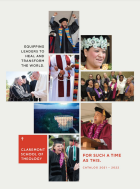Tell me, what is it you plan to do with your one wild and precious life?
Mary Oliver
Leadership is high-energy work, regardless of the religious or professional context. Inspired leadership is next level, which means fresh inspiration, re-centering and new skills are critical. This comprehensive 30-credit Doctor of Ministry program is designed specifically to allow you to take your existing leadership skills to a higher level, offering you a program that combines a core contemplative leadership foundation with the flexibility to focus on your specific needs, interests and organizational applications.
With core study in spiritual renewal through engaged compassion, discernment-based leadership, and new approaches to conflict, you will earn a world-class doctoral degree that provides you with the professional skills and confidence to deliver both personal and institutional guidance that is practical and transformative. We invite you to join us on a challenging, joyful and life-altering doctoral journey.
Who is this program for?
The Contemplative Leadership DMin is a practical doctoral degree designed for professionals in ministry, community work, non-profit management, or enlightened corporate leadership who want to enhance the inspiration they bring to their organizations and to the larger community. It’s a brave new world for leaders in all institutions, and this degree helps to provide the inner resilience and outer communication techniques needed to lead with vigor and sensitivity.
If management is a liberal art, then leadership is indeed a spiritual practice. Upon graduation from CST’s DMin in Contemplative Leadership, you will be able to
- demonstrate and apply advanced knowledge of the role and practice of contemplative leadership in your careers and ministries,
- understand and celebrate the intercultural aspects of leadership
- apply compassion-based leadership theory to practical, real-world leadership challenges
- expand your understandings of your leadership style and personal ministries, growing in spiritual awareness and compassion
Where are CST’s Contemplative Leadership DMin students in their life journeys?
Recent contemplative leadership DMin students include ministers from a variety of faith traditions, including Christian ministers from a wide variety of denominations, Muslim faith leaders, Jewish teachers and clergy, Buddhist practitioners and practitioners of Earth Religions, to name a few. Although students come from a variety of spiritual backgrounds and leadership roles, they share a deep desire to make a difference in the world. Despite the different names CST’s DMin students may have for the divine, they share a deep love of God and compassion for humanity. This love and compassion brings them together in their life journeys as they discern throughout the DMin how they can transform and translate their passions into practical, meaningful and impactful leadership in their various communities.
What is unique about the CST Contemplative Leadership DMin program?
The Contemplative Leadership DMin is unique in that its cornerstone is contemplative practice. Development of skills and projects is thus intentional and deliberative, as well as cultivating compassionate personal and spiritual growth. CST further recognizes that our students bring a variety of extraordinary talents and passions to the Contemplative Leadership DMin. Course and project work leverages the power of peer collaboration and results in the creation of teams, mentorships and similar leadership and ministry-enhancing relationships that persist long after graduation.
What does a Contemplative Leadership DMin Project look like?
The purpose of the Contemplative Leadership DMin is to enhance the practice of leadership in ministry. Therefore, the DMin project deals with a practical real-world issue, topic or need. Students select a practical research topic for application to a specific leadership or ministry context, according to the students’ interests and passions. The projects then address the implications of their findings in that context. Projects focus on the integration of theory and practice. The DMin project generally culminates in a paper that is 60-90 pages, excluding the table of contents, bibliography, and any appendices.
Here are the titles of some recent Contemplative Leadership DMin projects:
- Integrating Spirituality Into A Medical-Psychology Practice
- Reckoning with Shame on the Road to Emmaus: Moral Injury and a Reformed Model of Spiritual Care
- Establishing a Welcoming and Inclusive Interfaith Network in Salem, Oregon
- Shifa: Music and its Relation to African American Muslim Spirituality
- God in All Things: An Eco-Feminist Approach to the Ignatian Spiritual Exercises
- Staying at the Table: Spiritual Practices for a Compassion-Based Approach to Anti-Racism
- Passing Spirituality Cross Generationally Through Mentorship
- Spiritual Care in an Inpatient Adolescent Co-Occurring Mental Illness and Chemical Dependency Unit: An Integrated Spiritual Care
- Contemplation. Compassion. Creativity. The Sacred Trinity of Possibility.
- On Becoming Science-Informed Theologians: The Intersection of Emotion, Relationships, and Intellectual Community in the Theological Formation of Emerging Adult Christians
- The Essence of Real Leadership Truth, Wisdom, and Benevolent Consciousness
- Toward a Seventh-Day Adventist Biblical Theology of Prophetic Social Engagement: Social Justice and Social Righteousness
- Rooted in Faith: An Examination of the Role of Religion in the Boardrooms of Faith-Based Nonprofits
- Exploring Preksha Meditation as a Path to Shalom for Pastors
- Best Practices in Pastoral Leadership: Helping Congregations Thrive
- A Field Guide to Raise Awareness of the Historical Context and Essentials of Native Hawaiian Spirituality with United Methodist Clergy in the Hawaii District
Dr. Stephanie Butler
Co-Director of DMin in Spiritual Renewal, Contemplative Practice & Strategic Leadership
What are the admission requirements?
- Completion of MDiv degree or equivalent
- Graduate school GPA of 3.25 on a 4.0 scale is preferred
- Significant ministry experience (typically a minimum of three years)
- For those whose first language is not English, qualifying demonstration of English language competency
To see the full list of admission requirements, please visit the Deadlines & Requirements page.
What are the Curriculum Requirements and Schedule?
The Contemplative Leadership DMin consists of 30 credits of coursework distributed as follows:
Core Courses – 12 credits
(Meetings during fall intensives, in a cycle of 3 consecutive fall semesters)
TSF4046 Spiritual Renewal Through Engaged Compassion (4 credits)
TSF4082 Interspiritual Approaches to Visionary Leadership (4 Credits)
TSF4047 Compassion Based Approaches to Conflict (4 credits)
Elective Courses – 12 credits
Choose three courses (4 credits each) (12 credits)
These courses can be taken as online, hybrid-intensive, or in-person from CST’s regular courses or from any of CST’s cross-registration partner schools.
D.Min. Project Courses – 6 credits
TDP4060 D.Min. Project Development (1 credit, taken 4 times) and D.Min. Project (2 credits)
TOTAL – 30 credits
Want to learn more?
Reach out to the Admissions Counselor for this program, Elizabeth Strowbridge, by emailing estrowbridge@cst.edu or by using the below link to submit an inquiry form.



